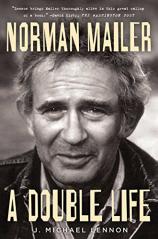Norman Mailer: A Double Life
Review
Norman Mailer: A Double Life
The fatal flaw for J. Michael Lennon’s biography, NORMAN MAILER: A DOUBLE LIFE, has nothing to do with writing style or methodology. I commend Lennon for writing a book that is thorough, well-researched, and full of intimate details about Norman Mailer’s life as a Pulitzer Prize-winning author, a public intellectual, and a one-time political hopeful. Rather, the fatal flaw of this 763-page behemoth is the very subject himself.
Norman Mailer is not a tragic hero. His self-destructive lifestyle could be metaphorically represented by a drunk teenager driving headfirst through a crowded street, slamming into people and objects around him with impunity. Despite this recklessness, Mailer seems more likely to feel self-pity than remorse, which only further distances him as a potential protagonist. NORMAN MAILER: A DOUBLE LIFE works well as a comprehensive account of a contentious mid-century writer. Mailer is undeniably emblematic of a specific time and place --- New York in the 1960s and ’70s --- and his influence within this historical context is clear. However, this biography does little to convince the reader that he is a figure who can make the leap from that time period to this. Is Mailer a figure worth revisiting in the modern day?
"I commend Lennon for writing a book that is thorough, well-researched, and full of intimate details about Norman Mailer’s life as a Pulitzer Prize-winning author, a public intellectual, and a one-time political hopeful.... [T]he fatal flaw of this 763-page behemoth is the very subject himself."
It is difficult to read page after page about Mailer’s self-inflicted problems primarily because there is nothing to learn from them: Don’t threaten to beat the crap out of your friends? Cheating on your wife the night she gives birth to your daughter will make her angry at you? Loudly proclaiming your own intellectual superiority alienates potential fans? Don’t stab people? Okay, nothing beyond the common sense. Perhaps we can give Mailer the benefit of the doubt and assume that he never learned these lessons as a child and, therefore, was subconsciously obligated to commit them in adulthood. This would not be surprising, considering his fanatically doting mother fed him a heightened sense of self in place of breast milk. After Mailer stabbed his second wife Adele and put her in the hospital, Mailer’s mother told reporters, “My son’s a genius.” Later, in her memoirs, Fan Mailer wrote, “Whatever happened with the stabbing [Adele] goaded him into it.”
Many of Mailer’s relationships don’t make sense. He was a polarizing figure who inspired both the loyalty of a martyr and the enmity of an aggressor. Indeed, it is difficult to determine with which persona Mailer most identified. On the one hand, he was obsessed with violence, war, alcohol, women, his own sexual prowess, and the immortal sanctity of the Great American Novel. On the other hand, he was a staunch liberal, advocating for the end of the Vietnam War, lifting up the lives of the incarcerated, and campaigning for Mayor of New York on a radically progressive platform that emphasized equality. Lennon does a good job of laying out these contradictions, although at times, his level of detail crosses the line from titillating to just plain disgusting. The description of how he lost his virginity is particularly revolting.
That said, methinks Lennon does protest too much in defense of Mailer. One anecdote from Mailer’s time at Harvard describes how his creative writing professor criticized a short story as “just a mash of brains and nausea” and gave Mailer a C-. Later, Mailer remembered the grade to be an A-, an error that Lennon claims is “clearly a tribute to the [professor] who helped launch [Mailer’s] writing career.” Or we could call it like it is: a narcissistic rewriting of history to fit his constructed ideal. Lennon, after all, is one of Mailer’s devotees and has spent many years accumulating, editing and reading Mailer’s work.
One cannot deny that Norman Mailer shaped the society and culture of New York in the ’60s and ’70s. His lasting influence, however, is not so clear. In order to claim a place in the American literary canon or in collective cultural memory, one must have something to teach. Was Mailer really revolutionary? As far as I can tell, he’s a writer best relegated to the past.
Reviewed by Shelby Wardlaw on October 17, 2013
Norman Mailer: A Double Life
- Publication Date: October 28, 2014
- Genres: Biography, Nonfiction
- Paperback: 960 pages
- Publisher: Simon & Schuster
- ISBN-10: 1439150214
- ISBN-13: 9781439150214




